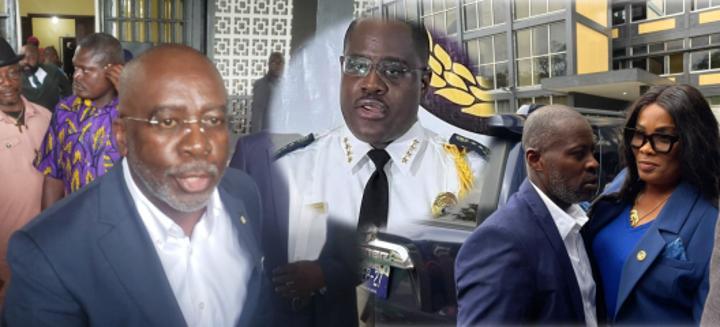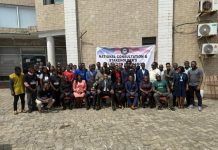Africa-Press – Liberia. The Monrovia City Court is set to rule in the coming weeks on a motion to dismiss the arson case involving former House Speaker Cllr. J. Fonati Koffa and four sitting lawmakers.
The case stems from the December 18, 2024 fire that severely damaged the Capitol Building, the seat of Liberia’s legislature. As preliminary hearings continue, the defense has mounted a vigorous challenge, labeling the prosecution’s evidence as speculative and politically motivated.
At the center of the defense’s argument is the assertion that the prosecution’s case is built on circumstantial evidence and hearsay rather than concrete facts. Cllr. Koffa, addressing the media following a recent court session, stated, “If it doesn’t make sense, it’s probably not legal.”
He emphasized that the police had control over the Capitol Building at the time of the fire, questioning why no law enforcement officers have been implicated in the incident.
The prosecution’s key piece of evidence is an alleged digital staff chat room linked to Koffa’s office, where messages were purportedly exchanged following the fire. One staff member allegedly posted about retrieving a suspect’s phone from the police station to prevent investigators from accessing potential messages related to the blaze. However, the defense contends that these allegations are speculative and insufficient to support criminal charges.
The defense further argues that no direct messages have been presented, no physical link has been established, and no clear motive has been convincingly outlined for why sitting lawmakers, including a former Speaker, would destroy the very institution they swore to protect.
Cllr. Koffa questioned the credibility of the prosecution’s evidence, stating, “They say they found plastic cuffs and gasoline containers, but not at the crime scene. They found them somewhere outside the Capitol’s vicinity. That doesn’t prove anything. It proves desperation.”
He also criticized the state’s reliance on fragmented audio recordings, some purportedly placing him at the President’s residence, as “a hodgepodge of unrelated recordings” being twisted to fit a weak narrative. “Being at the President’s house is now a crime?” Cllr. Koffa asked rhetorically. “The Legislature was tense at the time, yes. But tension is not evidence. Gossip is not guilt.”
Lawyers representing the accused, including sitting lawmakers, have moved for an immediate dismissal of the charges, arguing that no direct or physical evidence has been produced linking their clients to the crime. One defense attorney remarked, “This case should never have made it this far. It’s a distraction, a smear campaign, and an attempt to discredit strong political voices in the country. What we’re seeing is not justice. It’s a judicial ambush.”
If it doesn’t make sense, it’s probably not legal. There are a number of things that happen. First, the prosecution tried to avoid the fact that the police was in charge of the dealing at all times. So, you will be unable to avoid a trial of this matter, bringing the police in as co-conspirators, if indeed, an accident occurs. The circumstance is, the state witness testified that the evidence – the plastic cups and the stuff they used to transport the gasoline, they say they pulled the evidence outside of the vicinity. That doesn’t make sense. Finally, it’s a hodgepodge of recordings, unrelated. – Cllr. J. Fonati Koffa, former Speaker, House of Representatives
In contrast, the prosecution has presented forensic evidence to support its case. Deputy Commissioner of Police Alvin James testified that artifacts collected from the crime scene revealed that petroleum used to set the building ablaze was transported in a chlorax bottle. He stated that forensic analysis confirmed the presence of gasoline in the bottle.
Additionally, James testified that prior to the incident, meetings were held by the defendants at Invincible Park and PHP Park, where they allegedly agreed to set the Capitol Building on fire.
First witness Inspector ACP Rafell T. Wilson testified that his investigation charged the defendants after discovering communication between Thomas Isaac Etheridge and co-defendant Eric Susay about the burning of the Capitol Building on December 18, 2024.
Wilson also testified that after the fire incident, the police and other law enforcement agencies were immediately deployed at the crime scene and rounded up several employees, including Etheridge, who was at work before the building was burnt.
The arson attack on the Capitol Building occurred amidst heightened political tensions, including anti-government protests and the removal of Speaker Koffa from office. President Joseph Boakai condemned the act as “wanton destruction,” and police used tear gas to disperse crowds, arresting dozens of protesters. The protests followed the removal of Speaker Koffa, an opposition figure accused of corruption. The demonstrators also demanded President Boakai’s resignation.
The timing of the charges against the lawmakers, many of whom have been critical of executive overreach, has led political observers to question the motivations behind the prosecution.
For More News And Analysis About Liberia Follow Africa-Press






